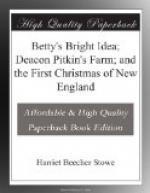“You!—you’ll never have anything! You’ll be a poor man as long as you live. Lost the Academy this Fall—that tells the story!”
“But, father, it wasn’t my fault that I lost the Academy.”
“It’s no matter whose fault it was—that’s neither here nor there—you lost it, and here you are with the vacation before you and nothing to do! There’s your mother, she’s working herself to death; she never gets any rest. I expect she’ll go off in a consumption one of these days.”
“There, there, father! that’s enough! Please don’t say any more. You’ll see I will find something to do!”
There are words spoken at times in life that do not sound bitter though they come from a pitiable depth of anguish, and as James turned from his father he had taken a resolution that convulsed him with pain; his strong arms quivered with the repressed agony, and he hastily sought a distant part of the field, and began cutting and stacking corn-stalks with a nervous energy.
“Why, ye work like thunder!” was Biah’s comment. “Book l’arnin’ hain’t spiled ye yet; your arms are good for suthin’.”
“Yes, my arms are good for something, and I’ll use them for something,” said Jim.
There was raging a tempest in his soul. For a young fellow of a Puritan education in those days to be angry with his father was somewhat that seemed to him as awful a sacrilege as to be angry with his God, and yet he felt that his father had been bitterly, cruelly unjust towards him. He had driven economy to the most stringent extremes; he had avoided the intimacy of his class fellows, lest he should be drawn into needless expenses; he had borne with shabby clothing and mean fare among better dressed and richer associates, and been willing to bear it. He had studied faithfully, unremittingly, for two years, but at the moment he turned from his father the throb that wrung his heart was the giving up of all. He had in his pocket a letter from his townsman and schoolmate, Sam Allen, mate of an East Indiaman just fitting out at Salem, and it said:
“We are going to sail with a picked crew, and we want one just such a fellow as you for third mate. Come along, and you can go right up, and your college mathematics will be all the better for us. Come right off, and your berth will be ready, and away for round the world!”
Here, to be sure, was immediate position—wages—employment—freedom from the intolerable burden of dependence; but it was accepted at the sacrifice of all his life’s hopes. True, that in those days the experiment of a sea-faring life had often, even in instances which he recalled, brought forth fortune and an ability to settle down in peaceful competence in after life. But there was Diana. Would she wait for him? Encircled on all sides with lovers, would she keep faith with an adventurer gone for an indefinite quest? The desponding, self-distrusting side of his nature said, “No. Why should she?” Then,




